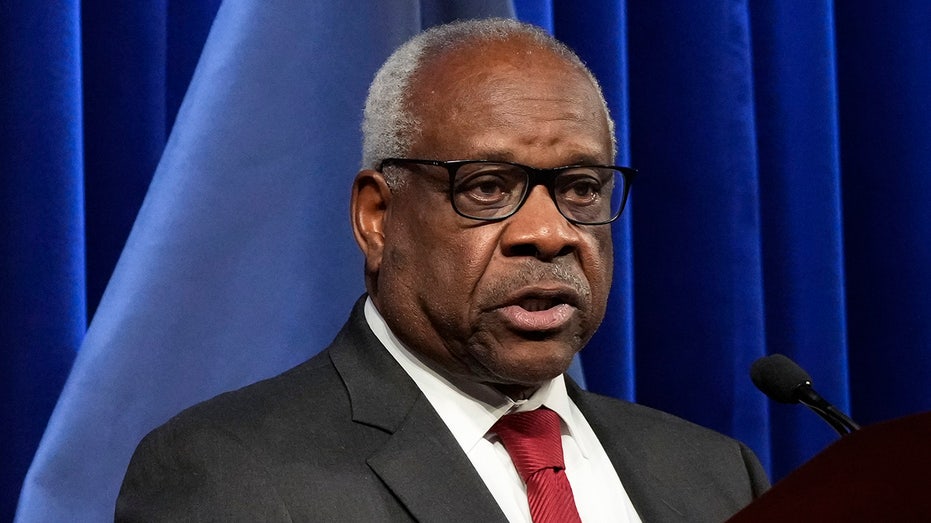Supreme Court rules for social media giants in cases over third-party content, declines to address Section 230
The major question of how far Section 230 should go remains unanswered
These two Supreme Court cases could upend the internet
Former Facebook analyst Kara Frederick weighs in on Twitter, Google comeuppance at Supreme Court after censoring conservatives and says Congress has to act on 'The Evening Edit.'
The Supreme Court on Thursday handed big tech companies, including Google and Twitter, legal wins in a pair of lawsuits alleging that the companies should be liable for ISIS attacks because of content the terror organization promoted using their platforms.
The companies were sued separately by the families of the victims. In the case against Twitter, Justice Clarence Thomas authored a unanimous opinion saying that the families did not provide sufficient evidence to establish that the companies should be held liable for aiding and abetting.
"Defendants allegedly knew that ISIS was using their platforms but failed to stop it from doing so," the ruling states. "Plaintiffs accordingly seek to hold Facebook, Twitter, and Google liable for the terrorist attack that allegedly injured them. We conclude, however, that plaintiffs’ allegations are insufficient to establish that these defendants aided and abetted ISIS in carrying out the relevant attack."
"By their very nature, the concepts of aiding and abetting and substantial assistance do not lend themselves to crisp, bright-line distinctions," the opinion states.
SUPREME COURT TO WEIGH GOOGLE AND TWITTER INTERNET FREE SPEECH POLICIES

The Supreme Court justices declined to answer the question of how far the scope of Section 230 of the Communications Decency Act goes. (AP Photo/Alex Brandon, File / AP Newsroom)
"The point of aiding and abetting is to impose liability on those who consciously and culpably participated in the tort at issue," Thomas added. "The focus must remain on assistance to the tort for which plaintiffs seek to impose liability."
The short opinion in the Google case was unsigned, with the decision stating:
"We need not resolve either the viability of plaintiffs’ claims as a whole or whether plaintiffs should receive further leave to amend. Rather, we think it sufficient to acknowledge that much (if not all) of plaintiffs’ complaint seems to fail under either our decision in Twitter or the Ninth Circuit’s unchallenged holdings below."

Justice Clarence Thomas authored the unanimous opinion in favor of Twitter. (Drew Angerer/Getty Images / Getty Images)
The justices declined to answer the question of how far the scope of Section 230 of the Communications Decency Act goes. The nearly 30-year-old law gives digital platforms a measure of immunity from some criminal and civil claims.
In one case, Gonzalez v. Google, the family of Nohemi Gonzalez claimed Google, as the owner of YouTube, willingly allowed the Islamic State group to post hundreds of videos that helped incite violence and recruit potential supporters. The 23-year-old U.S. citizen studying abroad was one of 130 innocents killed in Paris during a series of IS-affiliated attacks in November 2015.
Under Section 230, social media companies are not treated as the publishers of third-party content for liability purposes because they are not involved in the creative process, they simply provide a platform for others. During oral arguments, an attorney representing Gonzalez's family discussed how YouTube presents thumbnail images and links to different videos when providing search results or content that an algorithm believes a user might want.
The lawyer argued that while the videos themselves are created by users, the thumbnails themselves are joint creations of the user and YouTube, piercing YouTube's Section 230 protection.
In not addressing that argument, the Supreme Court sent the case back to lower courts for reconsideration.

Under Section 230, social media companies are not treated as the publishers of third-party content for liability purposes because they are not involved in the creative process, they simply provide a platform for others. (AP Photo/Jeff Chiu, File / AP Newsroom)
SIX OF THE MOST ANTICIPATED SUPREME COURT CASES WE COULD GET DECISIONS ON BY JULY 4
The other case, Twitter v. Taamneh, dealt with liability under Section 2333 of the Anti-Terrorism Act — and whether hosting terrorist content online could constitute "aiding and abetting" under federal civil law, regardless of liability protections in Section 230.
That matter was brought by American relatives of Jordanian citizen Nawras Alassaf, who was among the 39 people killed during a 2017 mass shooting inside an Istanbul nightclub. Three social media companies, including Twitter, were sued for civil damages, with the family claiming the companies provided a messaging platform for the gunman, who allegedly was recruited and directed by ISIS to carry out the attack.
Just how far Section 230 should go in giving social media platforms immunity for content has long been a contentious political issue, with many conservatives arguing that the law needs to amended.
CLICK HERE TO GET THE FOX NEWS APP
Sen. Josh Hawley, R-Mo., filed an amicus brief in the case against Google, arguing that that courts have consistently misread the text of Section 230 and that Congress never intended the law to shield companies’ knowing distribution of unlawful content.
"Google knows it has illegal content on its platforms, but they constantly point to Section 230 as their get-out-of-jail-free card. Enough," said Hawley of his filing. "In no way should Big Tech have this kind of immunity from the harm being inflicted by their platforms.




















